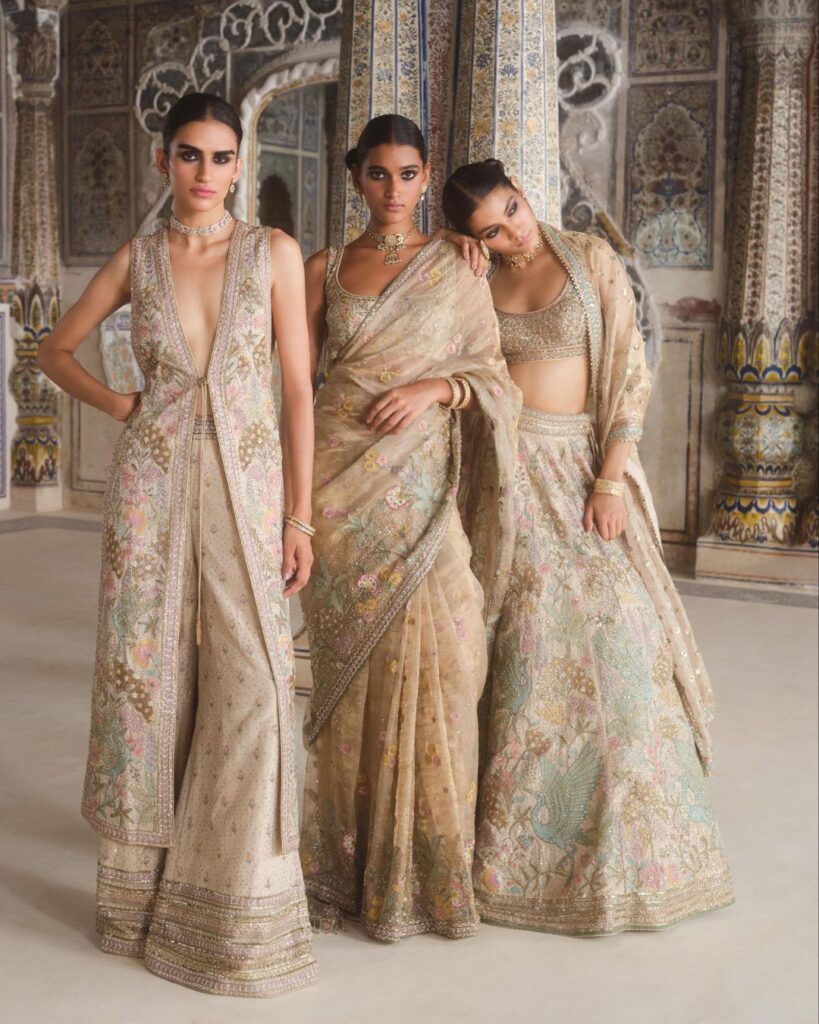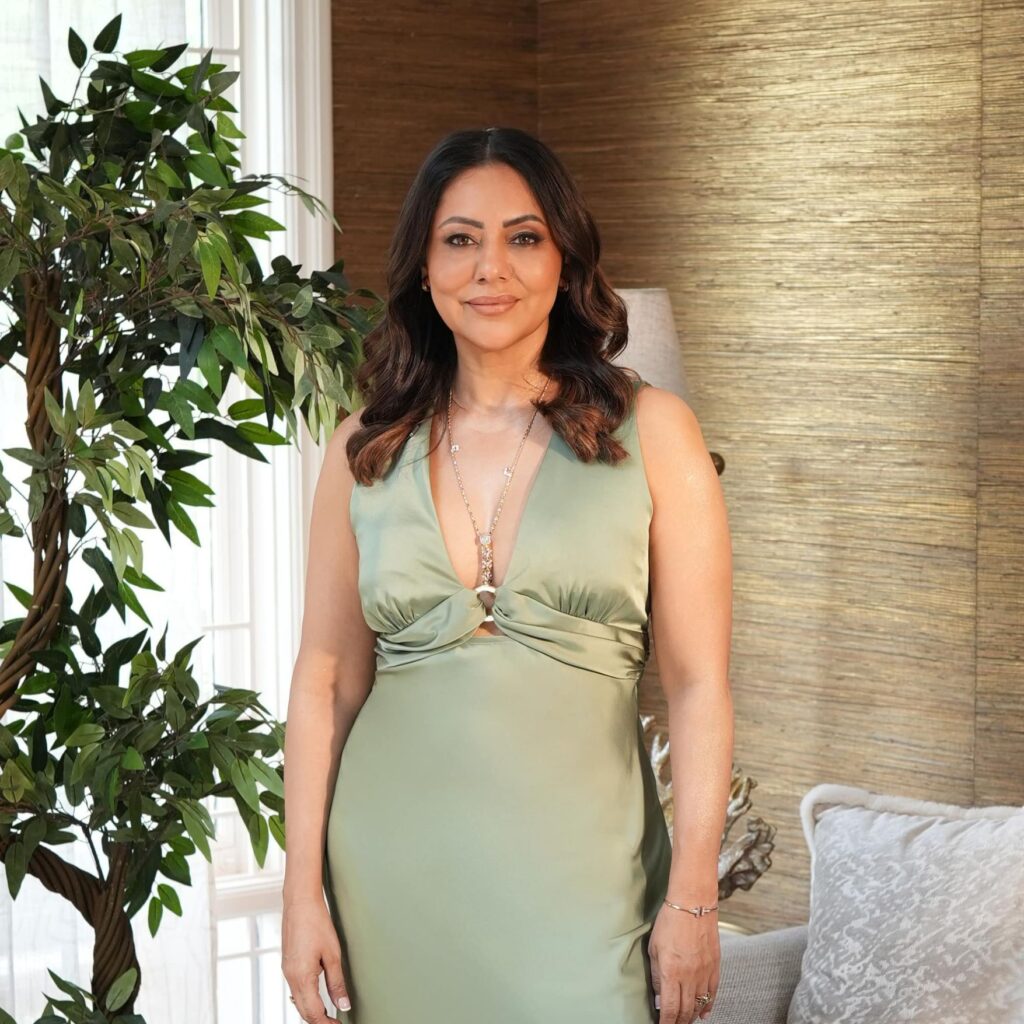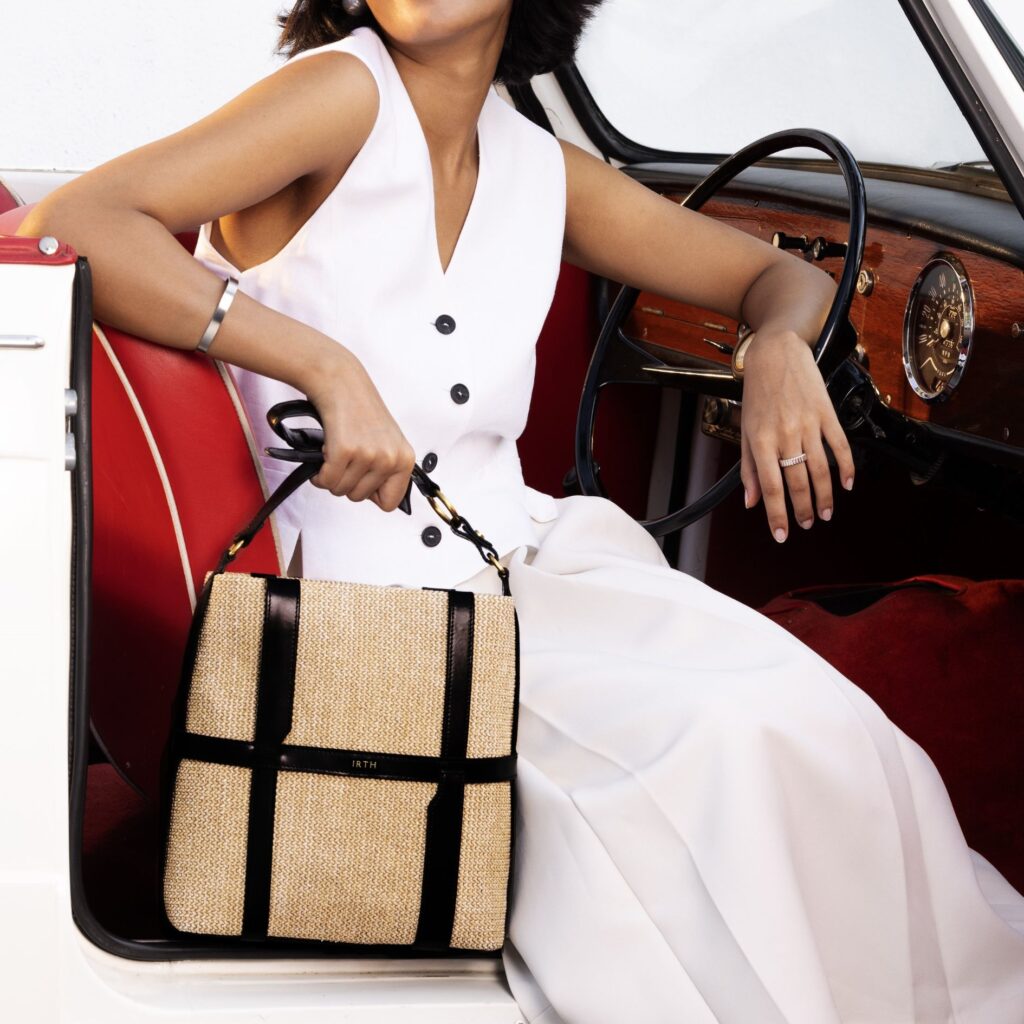Designer Anita Dongre speaks to The Word. about the importance of comfort, craft, and cruelty-free fashion.
- Fashion
Dear Brides, Please Be Comfortable At Your Own Wedding
- ByTeam The Word.

The Word.: How has the Indian bride changed over the years?
Anita Dongre: “She’s having the most fun at her wedding…finally! Today, it’s all about the Indian bride, honestly—she’s the star of the wedding, she’s the creator. An Indian bride visualises her wedding from a very young age. I meet so many young girls who already have Pinterest Boards of what their wedding will look like, what they’re going to wear, and the kind of food they’ll have at the wedding. They do their homework and are very clued into what each designer is doing. And that’s amazing because Indian brides know each designer’s design language, they understand their signature style, etc. And it’s beautiful to see how invested they are, the amount of knowledge they have about Indian weddingwear…that wasn’t the case earlier.”
TW.: Tell us more about Raahi, the FW ’24 bridal couture collection.
AD: “Our Fall-Winter ’24 collection—Raahi—celebrates Indian artisans. We have pieces featuring Pichhwai art, bandhani, hand-done Badla work, and beads from Banaras.
I have also brought back Gota Patti, which is our signature style. The collection also features reds and golds, but I particularly love the ink blue Gota Patti lehenga.”

TW.: Tell us why you like to bring lightness into formal wear.
AD: “When I began creating weddingwear 11 years ago, we were the first design house to introduce a ‘light’ bridal lehenga. Because I noticed that the Indian bride had changed—she’s dancing more than her friends at her wedding, for one. [Smiles]
Comfort has always been an important part of whatever I’ve created…so why can’t a bride be comfortable at her own wedding? We were the first ones to add pockets to lehengas 11 years ago. I have always wanted clothes to be light and comfortable, even on one’s most important special day. Rather, especially on one’s most important special day. You can look great and be comfortable.”
TW.: Who is the Anita Dongre bride?
AD: “The Anita Dongre bride is an elegant, independent woman. She is someone who’s proud of India, someone who loves Indian craft, but also prioritises comfort.”
Instagram will load in the frontend.
TW.: Tell us more about cruelty-free fashion.
AD: “Cruelty-free fashion is the most beautiful thing. I think, today, customers need to understand that the fancy handbag they are carrying is created out of somebody else’s pain and strife. A thing of beauty cannot come from pain and strife—it just goes against the very meaning of beauty. I have never used leather personally or in any of my brands ever, and that’s why I have a vegan line. I am also vegan by choice.”
TW.: What do you hope is the future of Indian craft?
AD: “I hope Indian craft thrives and prospers, and that it’s there for generations and generations ahead because that’s what’s so special about our country. In this mad, machine-made world, craft has the power to sustain livelihoods in Indian village. I feel extremely passionate about it, because empowering our villages is extremely important. It is important to ensure that our craft survives.”
TW.: What, according to you, needs to change to change to make this happen?
AD: “To make crafts survive, the customer needs to ensure that they purchase craft-led pieces. Ultimately, the power is in the customer’s hands… I think young women in India should choose a craft piece for their special occasion.”
TW.: Could you share the craft techniques that are close to your heart?
AD: “Any craft that empowers a woman is close to my heart. The needle is very powerful, because that needle in a woman’s hand can empower her and her whole family. And women use the power of the needle so beautifully, so graciously, so effortlessly.”
TW.: Your love for helping other women grow, does it come from personal experiences?
AD: “I have been surrounded by some amazing women—like my nani, my mother-in-law—and I have been born and brought up with sisterhood. We are three sisters, and I have a tonne of female first cousins—over 15, perhaps. My mother has had a very strong influence on my life. And this poured into the work I do as well—the sense of sisterhood.
I am self-made and I have gotten to where I have the hard way. This didn’t fall on my lap. I started with nothing and I’ve been blessed with a lot of opportunities that came my way. And with hard work and opportunity, the House of Anita Dongre is what it is today. And that comes with all the women around me who have supported me and made me who I am today.”

TW.: How would you define your personal style?
AD: “It’s simple and minimalistic. I like to be comfortable. Like today I’m just wearing a silk shirt dress, which I have in three colours. I have it in navy blue—I wore to my Kala Ghoda store launch—and I am wearing the green one today. I have very few clothes and whatever I have worn it over 40 times. For work, I have a uniform of five hemp-based outfits. I wear a hemp shirt with a hemp band or a linen shirt with linen pants. I think being sustainable is reusing and re-wearing till the clothes fall apart.”
TW.: Is that a tough philosophy when you’re selling bridal wear, because Indian weddings are so excessive?
AD: “The wedding is the most special moment in an Indian girl’s life. She’s been waiting all her life to dress up. So it’s their special day and it is okay to indulge that one time.”
TW.: How has your relationship with fashion changed over the years?
AD: “I have always loved fashion. I’ve been in love with fashion since I was a young girl—probably 14 or 15 years old, and I knew I wanted to be a designer. I used to go to Jaipur, get kadhas made from the kadha guy, get outfits made from the local tailors. I’ve always loved creating, and, today, fashion, for me, is empowering through creation.
It’s not work, it’s a passion.”
TW.: When you started out, what did you think the ‘House of Anita Dogre’ was going to be?
AD: “I knew when I began my career that House of Anita Dongre will be a big fashion house. I manifested it when I was 17-years-old. When I was in design school—I went to SNDT Women’s University, Mumbai—I did my first thesis on Ralph Lauren. And I said to myself, ‘Tthis is really interesting, he has built such a huge empire’. And it was there at the back of my mind that I would build something big.”
TW.: Is it tough to run a company…balance everything?
AD: “It is tough to run a company, but it has to be done. The ‘business of fashion’ is not something I enjoy, but I have to do it to be able to do what I like to do in the first half of the day.”
TW.: As a business, how does the House of Anita Dongre practice sustainability and mindfulness?
AD: “I believe it is important that you practice at your place of work what you do at home. If I am composting at home, I compost in the office too—our office is a green building.
In fashion, the materials you buy play a huge role in the sustainability quotient of the garment. So we’re mindful of the materials that we use and we’re always looking for more sustainable solutions. There’s always a desire to say, ‘Okay, we have this and I can create something with it, but there is a more sustainable option, so let me choose that’.
While we are mindful about sustainability, we are also a work in progress on that as we are constantly improving. We’re using compostable plastic now because you have to use plastic bags to pack, but yes, we can use a plastic that can get composted. We’re always struggling, fighting, craving, shouting…What can we do more?”
In a country like ours, you cannot waste anything. And the beauty of our country is that we never waste anything, ever! We were a country that preserved, recycled, and reused. And now because everybody’s got so much of material wealth, everyone’s becoming so casual about those things. But the planet can’t take all our waste—we need to be mindful of our waste. We need to think why we’re creating so much waste.
READ MORE
- Hyderabad Welcomes a Luxurious, New Residential Community With Signature Estates
- The Word. and Bumble Celebrated An Evening Of Scent, Sparks, and Mutual Connections
- How The Bicester Collection Quietly Became the Fashion Insider’s Best-Kept Shopping Secret
- Gauri Khan, On Her New Experience Centre In Delhi, Her Favourite Spot At Home, and Great Décor Advice
- With IRTH’s New Store in Noida, The Brands Adds To Its Joyful Delights





